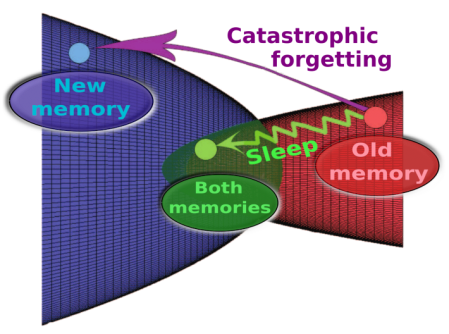Research Alert
Article URL: https://journals.plos.org/
Press-only preview: https://plos.io/3fsE1Tl
Image Caption: Representation of memories in an abstract synaptic space and its evolution with and without sleep.
Image Credit: Golden R, Delanois JE, Sanda P, and Bazhenov M, 2022, PLOS Computational Biology, CC-BY 4.0 (https://creativecommons.org/
Image URL: https://plos.io/3sVvivP
Article Title: Sleep prevents catastrophic forgetting in spiking neural networks by forming a joint synaptic weight representation
Author Countries: United States, Czech Republic
Funding: This study was supported by ONR (N00014-16-1-2829 to MB), Lifelong Learning Machines program from DARPA/MTO (HR0011-18-2-0021 to MB), NSF (IIS-1724405 to MB), and NIH (1RF1MH117155 to MB; 1R01MH125557 to MB; 1R01NS109553 to MB). The funders had no role in study design, data collection and analysis, decision to publish, or preparation of the manuscript.
Competing interests: The authors have declared that no competing interests exist.
About PLOS Computational Biology
PLOS Computational Biology publishes peer-reviewed, Open Access research articles. It features works of exceptional significance that further our understanding of living systems at all scales—from molecules and cells, to patient populations and ecosystems—through the application of computational methods. For more information follow @PLOSCompBiol on Twitter or contact [email protected].
Media and Copyright Information
For information about PLOS Computational Biology relevant to journalists, bloggers and press officers, including details of our press release process and embargo policy, visit http://journals.plos.org/
PLOS Journals publish under a Creative Commons Attribution License, which permits free reuse of all materials published with the article, so long as the work is cited.
About PLOS
PLOS is a nonprofit, Open Access publisher empowering researchers to accelerate progress in science and medicine by leading a transformation in research communication. We’ve been breaking boundaries since our founding in 2001. PLOS journals propelled the movement for OA alternatives to subscription journals. We established the first multi-disciplinary publication inclusive of all excellent research regardless of novelty or impact, and demonstrated the importance of open data availability. As Open Science advances, we continue to experiment to provide more opportunities, choice, and context for readers and researchers. For more information, visit https://www.plos.org/who-we-
Disclaimer
This press release refers to upcoming articles in PLOS Computational Biology. The releases have been provided by the article authors and/or journal staff. Any opinions expressed in these are the personal views of the contributors, and do not necessarily represent the views or policies of PLOS. PLOS expressly disclaims any and all warranties and liability in connection with the information found in the release and article and your use of such information.
